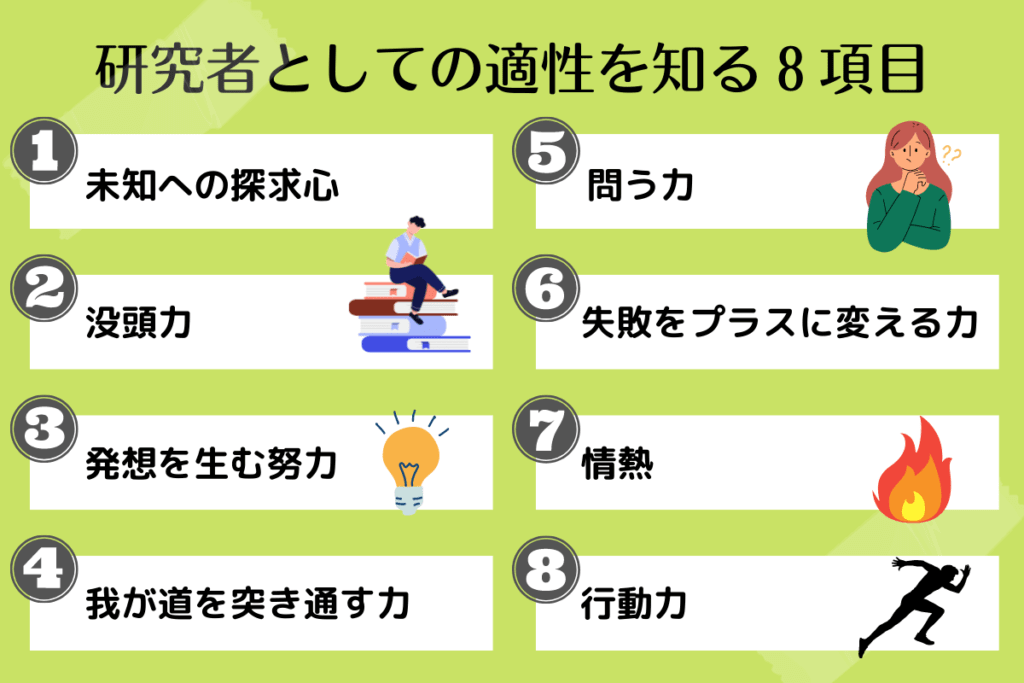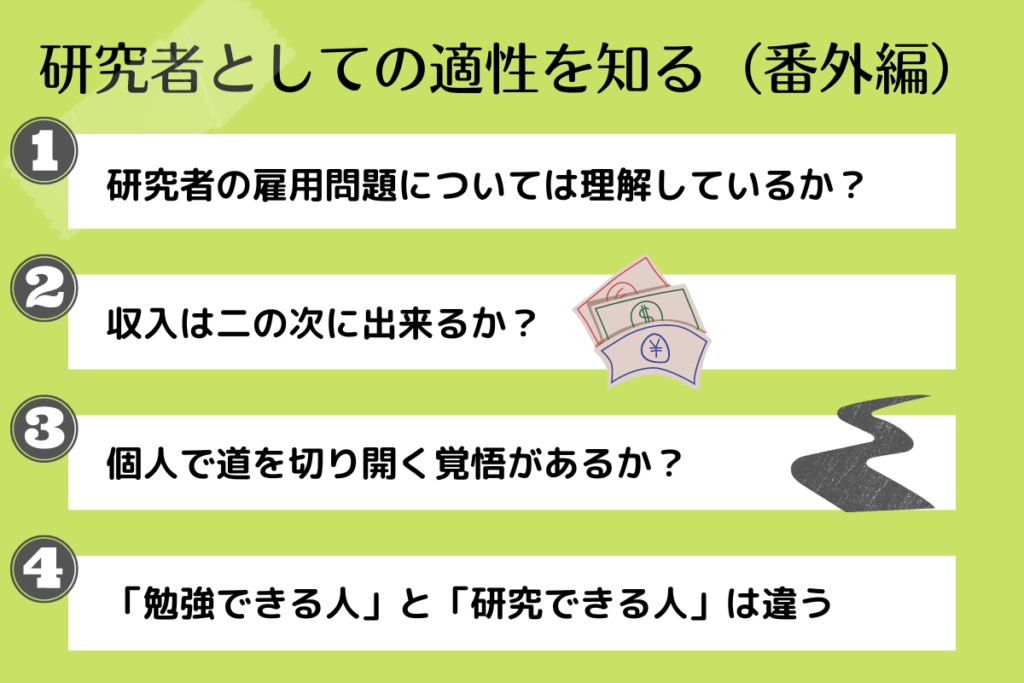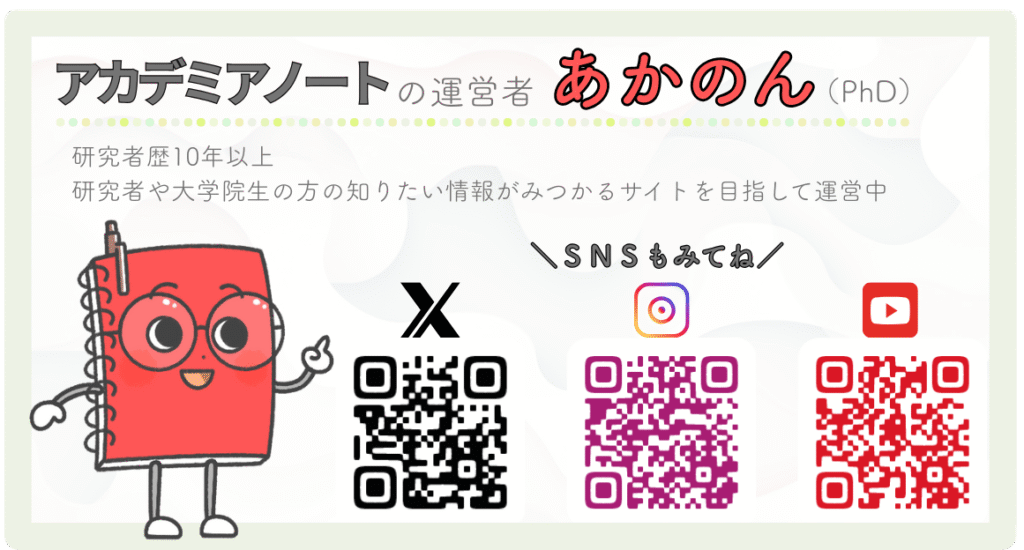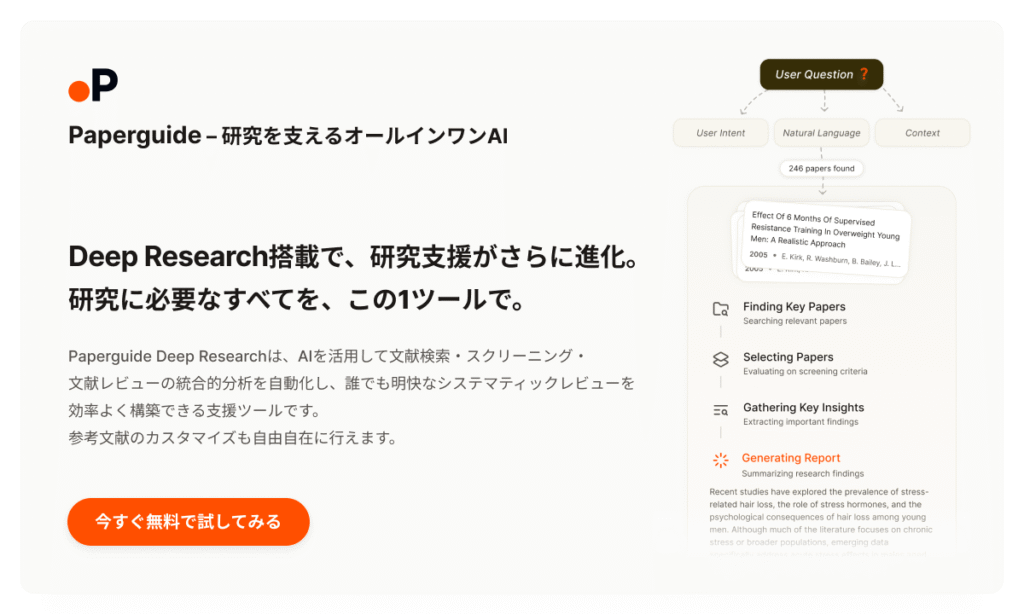This article describes the characteristics of a researcher's orientation.
In fact, there are many young researchers who have aspirations to become researchers and even enter graduate school with excellent grades, but quit the profession.
 Akanon
AkanonVery many people suffer from research and leave with mental illness.

Eh, but isn't it a group of excellent people?
As for whether excellence makes a good researcher...
 Akanon
AkanonThat is a big mistake.
Cases of people leaving the research profession are those that are personality-driven.Suitability for researchis greatly influenced by the
If you are not suited to be a researcher, it will only be hard with no results.
I can assure you that it would be much more efficient to use that ability in other professions.
This time,Quotes from great Nobel Prize-winning researchersand prepared a checklist to confirm your suitability as a researcher, citing the following
- Those who wish to pursue a career as a researcher
- Those who are beginning their career as researchers.
Eight checklists to determine your suitability as a researcher

(1) Can you maintain your quest for the unknown?

Research is about discovering the unknown.hypothesis testingThe process is repeated.
There is no perfect answer to the unknown.
What you thought was the answer may be covered tomorrow.
Seek the truth that cannot be overturnedCan you maintain a constant spirit of exploration?is the dividing line for a researcher.
Today's truth will be denied tomorrow.It may be.
That is why we will find the way forward tomorrow.
Hideki Yukawa (Nobel Prize in Physics)
The question is, "Is it enough to go this far?", "Isn't this the limit?", "Is it too late to go back to the basics?
To start over and continue after having achieved so much.There were many different voices in the
But I thought, "This is the beginning."
That's the dividing line.。
Isamu Akasaki (Nobel Prize in Physics)
The more I learn, the more I realize how ignorant I am.We are reminded of how much it is
The more you realize your ignorance, the more you want to learn more.(Excerpts and abbreviations omitted)
Albert Einstein (Nobel Prize in Physics)
Those who explore the unknown,
I am a traveler without a map.。
Hideki Yukawa (Nobel Prize in Physics)
This is a personalitybeing cut out for certain things (and not for others)is greatly influenced by the
If you are the type of person who finds it challenging to provide answers, we encourage you to explore other avenues.
(e.g., tax accountants and accountants who deal with numbers, lawyers who dispute results, etc.)
 Akanon
AkanonThe better you are, the more you will see "perfectionism (psychology)may possibly be unsuitable for research.
(2) Can you immerse yourself?

Have you ever been so absorbed in something that you were thinking about it 24/7?
A personality that can immerse itself in something is a great driving force for research.
It is not enough to take time.
What I was really trying to do wascannot get out of one's mind。
I keep thinking about it.。
Masatoshi Koshiba (Nobel Prize in Physics)
To accomplish certain things,
You have to cut out a lot of other things.
It's no good.
Susumu Tonegawa (Nobel Prize in Physiology or Medicine)
I am not a smart person.
Just longer than others,
We are just trying to face the problem.(Excerpts and abbreviations omitted)
Albert Einstein (Nobel Prize in Physics)
The operators are also keenly aware of the greatness of people who can immerse themselves in real-life experiences.
I have the impression that personality factors also play a large role in this regard.
 Akanon
AkanonI think this is a very important part of this checklist.
(iii) Can you make an effort to generate ideas?

The ability to be imaginative and generate new ideas is essential for a researcher.
What is this idea?The result of broadening your knowledge and thoroughly thinking things through on your own.It is.
Originality" that comes from thorough thoughtand have the "tenacity" to carry through to the end.
Without these two wheels, we cannot realize our big dreams.
Shuji Nakamura (Nobel Prize in Physics)
We can only judge things based on what we know.
So a forecast is only as good as your knowledge.
Shinya Yamanaka (Nobel Prize in Physiology or Medicine)
A discovery is something that everyone has seen before.
With a careful eye on the future.Something none of us have ever thought about,
St. Gerge Albert, Nobel Prize in Physiology or Medicine
It is something to think about.
The secret to ideas is persistence.
Hideki Yukawa (Nobel Prize in Physics)
 Akanon
AkanonIdeas are not about coming up with something out of the blue!
It is the result of a great deal of effort.
It is similar to the power of immersion.
(4) Can we go our own way?

There are "fads" in research as well.
A certain target attracts attention, or many researchers use novel experimental or analytical methods all at once, and so on.
However, the ability to not be swayed by fads and to go our own way is extremely important.
The importance of following through on a path you believe inThe great men also taught that the
Even if 99 out of 100 people say this is the case,
Sometimes one is right.。
Masatoshi Koshiba (Nobel Prize in Physics)
Don't try to pick at the corners of a heavy box.
Like filling a small but empty stacked box.It's not an imitation of someone else.Be creative.。
Akira Suzuki (Nobel Prize in Chemistry)
Rather than following what others are doing.
Something different.I always think that we should try to
It's easier that way because there's no competition.
Yoichiro Nambu (Nobel Prize in Chemistry)
In the beginning, the originality isminorityThe first is.
Hideki Yukawa (Nobel Prize in Physics)
Majority is not originality.
I do not imitate others. If I imitate, that's where it ends.
Satoru Omura (Nobel Prize in Physiology or Medicine)
(5) Do you have the ability to ask the question?

You have to get into the habit of thinking for yourself about everything.
Do not believe what people tell you.
Even what is written in textbooks can be wrong.
"Why is this happening?" "Is this really right?" andAlways keep asking yourselfAttitude is important.
What people are saying and what the textbooks say.Don't believe everything you read.
Tasuku Honjo (Nobel Prize in Physiology or Medicine)
You say that the ability to think and answer is declining,
Most worrisome is that there is little or no "ability to ask."
Ryoji Noyori (Nobel Prize in Chemistry)
The Japanese first decide who their role models are and then compete with them.
But,The idea is a curse.The company has been
What kind of studies do you have to do to win a Nobel Prize, and what kind of studies do you have to do to win a Nobel Prize?。
Leona Esaki (Nobel Prize in Physics)
(6) Can you turn failure into a positive?

Research is more than the results of one's hypothesis,It's far more likely that the result will be otherwise.It is a thing.
capable of repeating the challenge without being defeated by its negative results.an indomitable spiritis essential for researchers.
Successful people don't talk about failure. ButFailing twice or three times more than othersThe company is doing so.
Satoru Omura (Nobel Prize in Physiology or Medicine)
I often say.
We must not be afraid of failure.If you can't fail, you can't succeed.。」
He said, "Everyone who succeeds has failed."
Isamu Akasaki (Nobel Prize in Physics)
Expertise in a very narrow field,
All kinds of failuresを
Niels Bohr (Nobel Prize in Physics)
It is a human being who has been layered.
If the result of the challenge is failure,
The advantage of being able to switch heads in a new direction based on this occurs.
I have made many mistakes in my own life and have learned from them.
Leona Esaki (Nobel Prize in Physics)
A person who has never made a mistake is a person who has never made a mistake,
We're not doing anything new.People.
Albert Einstein (Nobel Prize in Physics)
 Akanon
AkanonYou have talked about how you have repeatedly made mistakes before achieving great achievements. I think these are really precious words.
(7) Can you have passion?

Passion is the driving force above all else.
I want to develop a drug that will cure 00 disease."
I want to figure out the mechanism of 00's disease."
I want to apply this research to society in this way."
If you have a research project that you are truly passionate about, you are very fortunate.
What I really want to do.
Once you find them, you're all set!
Masatoshi Koshiba (Nobel Prize in Physics)
after all is said and done(He who is firm in his purpose will surely achieve it.)
Tasuku Honjo (Nobel Prize in Physiology or Medicine)
Do what you really love.
If it's something you really like, even if it doesn't work out and you get depressed, you can get up again and keep going.
Isamu Akasaki (Nobel Prize in Physics)
 Akanon
AkanonIt is difficult for young people to find "what they want to do" right away, but I would like them to always keep searching for it.
(viii) Do you have the ability to act?

When the idea comes to mind, act immediately.! The researcher who is a strong
Even if you put together an empty theory on the table, it is not easy to achieve the results you have in mind.
Before worrying about it, I'm going to try it anyway.
Such dynamism and mobility are required of researchers.
take actionBy,
Satoru Omura (Nobel Prize in Physiology or Medicine)
Something is born.
We must take action,
Nothing comes of it.
I don't wait for feelings to take over.
Pearl Buck (Nobel Prize in Literature)
You will never accomplish anything if you do that.
You have to know that you are going to get to work anyway.
Wishing for happiness is not enough to achieve peace.
Alfred Nobel (initiator of the Nobel Prize)
Checklist to know your aptitude as a researcher (extra)

As an extra, we have compiled a list of things you should know about becoming a researcher.
This is a special way of working that is different from that of company employees, so please check.
(1) Do you understand the employment issues of researchers?

In Academia,Tenure (non-tenure) positions are scarce.The company is doing so.
 Akanon
AkanonIn other words, it is difficult to obtain a lifetime position like a company employee.
Young researchers in particular are more likely to be placed in fixed-term "post-doctoral" positions.
During the post-doctoral period, there are many times when one is mentally trapped by problems of hiring and income.
Please refer to the related articles posted here.
postdoctoral problemAbout
The Problem of Hiring and Retrenchment of ResearchersAbout
(2) Can you make income a secondary concern?

Until a stable post is obtained, the economic situation will be very precarious.
If he were to continue as a postdoctoral fellow for three years after graduating, he would be around 30 years old.
Compared to my friends in the same period.Fairly low salary levelsThey are forced to live in
This is the age when many life events such as marriage and childbirth await.
Ponder whether you can maintain your passion for research even if you have to put your income second.
postdoctoral researcherThe annual income of
However, if you are able to obtain a tenure post with no fixed term, your salary level will be higher than average.
(iii) Are you ready to make your way alone without relying on an organization?

In recent years, it is generally accepted that we are in an era of individual activities, independent of a company.
The proportion of individual activities is higher, especially for researchers.
You will be responsible for everything from obtaining positions, research planning, research funding, recruiting personnel, educational activities, and media dissemination.
 Akanon
AkanonA company manager, so to speak!
Energetic individuals who are willing to carve their own paths are in demand.
4) Don't you think that "people who can study" are mistaken for "people who can do research"?

Last but not least, this mistake is very common!
The ability to structure and execute research and the smarts to pass exams, etc.Totally different.。
Please refer to the checklist (1) to (8) fully.
summary

In this article, we have presented eight items to check for a researcher's suitability for the position!
 Akanon
AkanonThank you for reading to the end.
Article updates are also posted on X and Instagram.
Please follow us and check it out!
- click here
- Click here for the installation.
- Click here for YouTube (in preparation)
- Click here for NOTE

request
Thank you for taking the time to read this article.
This is a personal site that the operator updates little by little in between his personal life.
If you found the content of this site helpful,
We would be happy to receive feedback on social networking sites.
The feedback we receive will encourage us to create future articles.

